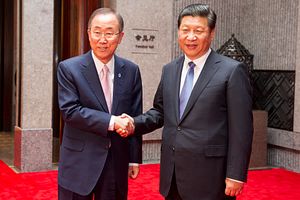China effectively internationalized its dispute with Vietnam over an oil rig in the South China Sea on Monday by submitting its claim against Hanoi to the UN Secretary General.
As Shannon reported yesterday, on Sunday China’s Foreign Ministry released a statement entitled, The Operation of the HYSY 981 Drilling Rig: Vietnam’s Provocation and China’s Position, which criticized Vietnam’s alleged provocations over the oil rig and provided the “most comprehensive outline to date of China’s claims to the Paracel Islands.”
Late Monday, that statement was posted on the website of China’s permanent mission to the United Nations. According to the Associated Press, on Monday China’s Deputy Ambassador to the UN, Wang Min, sent the paper to Secretary General Ban Ki-moon and asked him to circulate it among all members of the UN General Assembly.
On the surface, China’s decision to raise the dispute at the United Nations is rather puzzling. After all, China has repeatedly and consistently criticized other claimants in its various maritime disputes, as well as third parties like the United States, for what China claims are attempts to “internationalize” the issue. Actions that won criticism from China included merely raising the issue at regional forums like the Shangri-La Dialogue or summits of the Association of Southeast Asian Nations (ASEAN). In addition, Beijing has refused to respond to the case the Philippines has filed with the UN’s Permanent Court of Arbitration over Manila’s own territorial disputes with Beijing in the South China Sea.
Instead, China has advocated that the claimants to the South China Sea disputes settle outstanding sovereignty issues through direct, bilateral negotiations where Beijing’s influence over its smaller neighbors will be greatest.
China’s rationale for internationalizing the oil rig dispute with Vietnam near the Paracel Islands is likely that no territorial dispute exists in that case. China currently administers the Paracel Islands and has therefore refused to acknowledge that a territorial dispute exists at all. Instead, Vietnam’s attempts to prevent China from setting up an oil rig is portrayed by Beijing as unbridled aggression, which makes the UN is the right venue to resolve the issue.
In reality, China’s decision to raise the issue at the UN likely reflects Beijing’s growing concern over its neighbors’ use of international law to negate China’s military superiority. Besides the Philippines’ case mentioned above, Vietnam has threatened to appeal to international arbitration to resolve the Paracel Islands dispute ever since the oil rig row began last month. In doing so, it would likely have the full support of Japan, Australia, and the United States, among many others.
By proactively raising the issue at an international body and outlining its claims of sovereignty, China is likely trying to dissuade Vietnam from acting on its threats to appeal to international law. This strategy seems evident from the statement’s extensive outline of the basis for China’s sovereignty claims, as well as its effort to link these claims to various international treaties like UNCLOS.
On the one hand, this strategy makes sense for the Paracel Islands, where China’s sovereignty claims are fairly strong. Thus, Beijing is almost certainly hoping that the prospect of losing will force Vietnam to back off from its international arbitration threat, and that the futility of Hanoi’s attempts to use international law will deter other claimant states from doing likewise.
This is a dangerous gamble, however, as China is internationalizing the dispute and lending credence to international law as a basis for sovereignty claims and resolving disputes. While this might work in China’s favor in its dispute with Vietnam over the Paracel Islands, Beijing’s nine-dash line claim more generally is fundamentally at odds with international law. China therefore risks establishing a precedent that it will not want to uphold in many similar cases.
Interestingly, Deputy Ambassador Wang also delivered a speech on Monday at a meeting commemorating the 20th Anniversary of the United Nations Convention on the Law of the Seas (UNCLOS) entering into force. According to an English-language transcript published on China’s UN website, Wang’s speech did not directly mention Vietnam or the South China Sea. Instead, Wang praised UNCLOS and said that China fully abides by the treaty, before adding that it was the “lawful rights of countries to independently choose a way to peaceful[ly]” resolve any disputes.
Right on cue, Wang clarified:
“The Chinese government believes that the most effective way to peacefully settle maritime disputes is negotiation and consultation between the parties directly involved in the dispute on the basis of respect for historical facts and international law. This is also what the majority of countries did in successfully settling their maritime disputes [emphasis added].”
Wang’s remarks clearly underscore that China has not changed its general position on maritime disputes, and the speech was likely an attempt to signal this fact to other states.
































